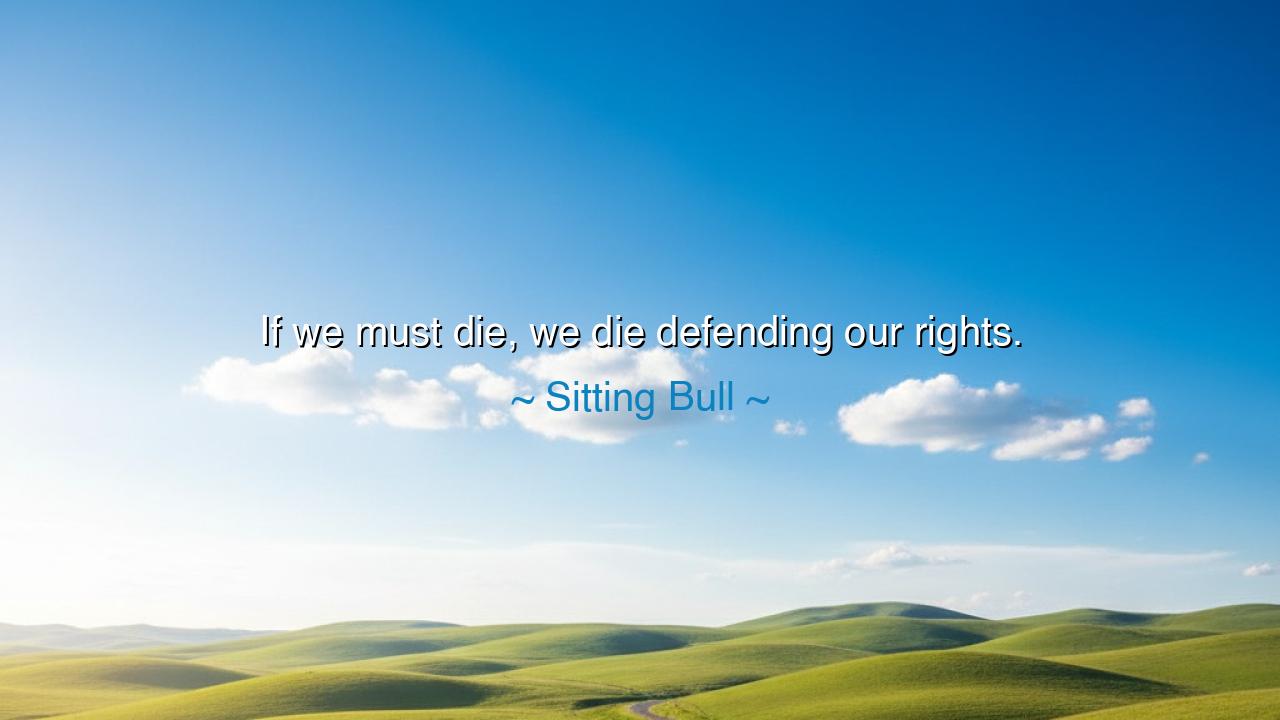
If we must die, we die defending our rights.






“If we must die, we die defending our rights.” Thus declared Sitting Bull, the great Hunkpapa Lakota leader and spiritual warrior whose life burned with defiance, dignity, and unyielding love for his people. These words are not merely a cry of resistance—they are a hymn to freedom, a declaration that the worth of life lies not in its length, but in its honor. To die in the defense of one’s sacred rights is, in his teaching, not defeat but transcendence. It is to join the eternal ranks of those who stood unbroken before the storms of oppression and refused to yield their spirit.
Sitting Bull spoke these words in a time when his world was collapsing—the buffalo herds destroyed, his people confined, his lands stolen under false treaties. Yet even when faced with overwhelming power, he did not plead for mercy; he spoke of dignity. His words echo across centuries as both lament and command: if death must come, let it come while standing, not kneeling; let it come while protecting the sacred inheritance of freedom, rather than surrendering to chains. To defend one’s rights, for him, was not rebellion—it was duty. It was the expression of life’s deepest truth: that no man, no nation, has the right to take from another the breath of liberty given by the Great Spirit.
The ancients, too, understood this sacred law. The Spartans at Thermopylae stood before the Persian armies knowing they would perish, yet Leonidas told his warriors, “Come and take them,” when ordered to surrender their arms. In their final stand, they discovered immortality. So too did Sitting Bull and his people, who faced the armies of the United States not as aggressors, but as guardians of their way of life. For both, freedom was worth more than survival, and honor worth more than comfort. The courage to die defending one’s rights is not born of hatred—it is born of love: love of one’s land, one’s people, one’s truth.
Consider the story of Little Bighorn, the battle where Sitting Bull’s vision led his people to victory against General Custer. It was not conquest they sought, but justice. Before that battle, Sitting Bull had fasted and prayed for guidance, and he saw in a vision soldiers falling like grasshoppers from the sky—a sign of triumph, but also of sorrow. When the victory came, he did not rejoice in bloodshed; he grieved for the necessity of war. For he knew that even victory carries the cost of human life. Yet through that struggle, he proved the meaning of his own words: if death must come, let it come while defending what is sacred.
Sitting Bull’s quote also speaks to the moral law of courage, a law not bound to any tribe or time. To “die defending our rights” need not always mean the battlefield; it may mean standing against injustice in any form—when truth is silenced, when the innocent are oppressed, when the weak are exploited. To defend one’s rights is to affirm one’s humanity. The coward lives long but emptily; the brave may die young but lives forever in the memory of those who continue the struggle. The act of defiance in righteousness is itself a form of immortality.
In his final years, hunted and betrayed, Sitting Bull still refused to yield. Even when imprisoned, his spirit remained free. When asked to submit to government control, he answered not with rage, but with unbroken will. His death in 1890, shot by those meant to guard him, became the tragic fulfillment of his own prophecy. He died defending his rights—not with sword in hand, but with faith unshaken. And in that moment, his life transcended time; he became a symbol of every people who have ever fought to preserve their dignity against tyranny.
The meaning of his words, then, is both heroic and tender. To live rightly is to live with purpose; to die rightly is to die for that purpose. The death of the body is inevitable, but the death of the spirit is a choice—and Sitting Bull teaches that we must never choose it. Every generation faces its own form of conquest, its own temptation to surrender for comfort. His wisdom commands us to resist that slow death of the soul and to fight, in whatever way we can, for truth, justice, and the rights that make us human.
The lesson, my listener, is this: live with such conviction that even death cannot silence you. Defend what is right, even when the world says it is hopeless. Speak truth, even when it brings danger. Love freedom enough to bear its burdens, for it is better to fall in its defense than to live enslaved in safety. Remember Sitting Bull’s words as both warning and blessing: If we must die, we die defending our rights. For in that defense lies the eternal flame of the human spirit—the fire that no conqueror can extinguish, and no death can destroy.






AAdministratorAdministrator
Welcome, honored guests. Please leave a comment, we will respond soon